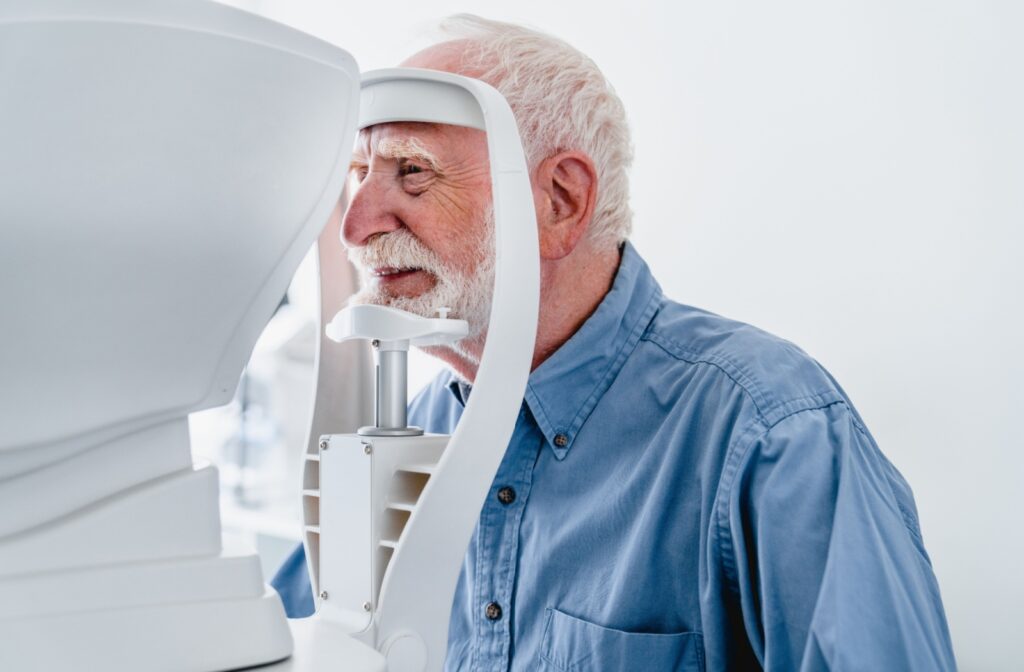As you get older, you might notice changes in your vision. One common change is the development of cataracts, which can make it feel like you’re looking through a foggy window.
While cataracts are a very common part of aging, most people will develop some lens clouding, but not everyone will need surgery to correct them. Scheduling regular adult and senior eye exams can help you manage your vision every step of the way.
What Is a Cataract?
A cataract is a clouding of the lens inside your eye, which is normally clear. The lens works to focus light so you can see things sharply. When a cataract forms, it scatters that light, which can make your vision blurry and less vibrant.
First Signs of a Cataract
Cataracts often develop slowly, and you might not notice them at first. As they progress, you may experience symptoms such as:
- Vision that is cloudy or blurry
- Colors that look faded or yellowish
- Trouble with vision at night
- Lamps, sunlight, or headlights that seem too bright
- A halo effect around lights
- Double vision in one eye
- Frequent changes to your glasses or contact lens prescription
Who Is at Risk for Cataracts?
Age is the most common reason people develop cataracts. While aging is the main factor, other things can increase your risk of developing them sooner, including:
- A family history of cataracts
- Health conditions like diabetes
- Smoking
- High blood pressure
- Previous eye injury
- A lot of time spent in the sun without eye protection
The Typical Age for Cataracts
The very early changes in your eye’s lens that lead to cataracts can start around age 40. However, most people don’t notice vision problems from cataracts until after age 60. They tend to progress slowly over a number of years.
How to Lower Your Risk
You can’t stop the clock, but you can adopt habits that support your long-term eye health. Simple lifestyle adjustments can make a positive difference for your vision. These proactive steps can help you protect your eyes for years to come:
- Protect your eyes from the sun: Wear sunglasses that block UV rays and a hat with a brim when you’re outside.
- Eat a balanced diet: Include plenty of fruits and vegetables, especially dark, leafy greens like spinach and kale.
- Stop smoking: Quitting smoking offers many health benefits, including for your eyes.
How an Eye Doctor Can Detect Cataracts
Cataracts are typically found during a comprehensive eye exam. Regular check-ups allow your eye doctor to monitor any changes in your vision or the health of your eyes.
The Dilated Eye Exam
To check for cataracts, your eye doctor may perform a simple and comfortable dilated eye exam. They use eye drops to widen your pupils, allowing them to get a clear view of the lens and other parts of your eye to look for cataracts or other conditions.

Your Options for Cataract Treatment
If you have a cataract, you may not need treatment right away. The approach depends on how much the cataract affects your ability to do everyday things. Together, you and your eye doctor can decide on the right path for you.
Early Stage Adjustments
Initially, you may be able to manage your symptoms with a few simple adjustments. These can include a new prescription for your eyeglasses or brighter lights for reading. Anti-glare sunglasses can also help reduce discomfort from bright lights.
When to Consider Surgery
Your eye doctor may suggest surgery when cataracts get in the way of your daily life, such as reading, watching TV, or driving. During the procedure, the clouded lens is removed and replaced with a new, clear artificial lens. This common procedure helps restore vision for many people.
Cataract Management at Total Vision Hercules
Cataracts are a normal part of aging, but they don’t have to get in the way of your life. The key is to manage the condition so it doesn’t interfere with your activities and independence.
Regular visits with our Total Vision Hercules team can help you maintain your vision for years to come. We’re here to help you see clearly at every age. Schedule your next eye exam easily and conveniently online.



